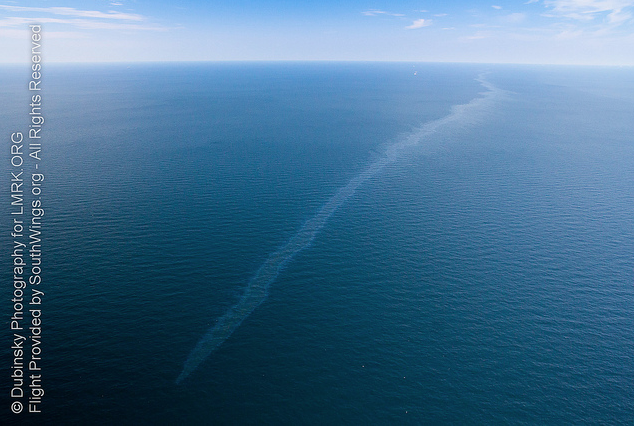Lawsuit seeks withheld information about leaking Gulf oil wells

Clean water advocates have filed a Freedom of Information Act (FOIA) lawsuit against the U.S. Coast Guard over its refusal to answer public records requests about an oil spill in the Gulf of Mexico that's been fouling waters off Louisiana's coast for more than eight years.
In September 2004, Hurricane Ivan triggered a mudslide on the Gulf seafloor that damaged a cluster of oil wells owned by New Orleans-based Taylor Energy. Oil has been leaking from the site ever since, sending out a thin slick that's visible from the air and at times has stretched over 18 miles. The spill site is about 11 miles from the mouth of the Mississippi.
The Waterkeeper Alliance and five affiliates filed the complaint this week after the Coast Guard denied two FOIA requests from the groups seeking information about the cause of the leak, the amount of oil spilled, and what's being done to stop it.
"We filed this suit to stop the spill and lift the veil of secrecy surrounding Taylor Oil's eight-year long response and recovery operation," said Marc Yaggi, executive director of Waterkeeper Alliance. "The public deserves to know how this spill happened and why it continues."
The other plaintiffs are the Louisiana Environmental Action Network's Lower Mississippi Riverkeeper program, Louisiana Bayoukeeper, Atchafalaya Basinkeeper, Galveston Baykeeper, and Apalachicola Riverkeeper. They're represented by the Tulane Environmental Law Clinic in New Orleans.
In February 2012, the same groups filed a lawsuit against Taylor Energy under provisions of the federal Clean Water Act and Resource Conservation and Recovery Act that allow for citizen enforcement of environmental laws. Taylor filed a motion to dismiss the suit more than seven months ago, but the judge has not issued a ruling yet.
SkyTruth, a West Virginia-based watchdog group that uses satellite imagery for environmental monitoring, discovered the Taylor Energy leak in May 2010 while studying BP's nearby Deepwater Horizon oil disaster. Last year, SkyTruth estimated that somewhere between 250,000 and 1.2 million gallons of oil had spilled from the Taylor site -- 100 times higher than the Coast Guard's estimate of 12,270 gallons.
This isn't the first time SkyTruth has disagreed with an official estimate of an oil spill: In the early days of BP's Deepwater Horizon spill in 2010, the group found that the federal government underestimated the flow rate, leading it to adjust the official calculation upward.
"The Taylor Oil spill is emblematic of a broken system, where oil production is prioritized over concerns for human health and the environment," says Lower Mississippi Riverkeeper Paul Orr, who notes that in the almost three years since the BP disaster none of the comprehensive reforms recommended by the National Oil Spill Commission have been enacted.
Taylor Energy was founded in New Orleans in 1979 by Patrick F. Taylor and grew into one of the largest privately owned oil and gas operators in the Gulf. After Taylor died in 2004, his wife, Phyllis Taylor, took over the company. She is a major contributor to political candidates and causes, with most of her contributions going to Republicans, according to the Center for Responsive Politics.
In 2008, Taylor sold the company's energy assets to a joint venture between Korea National Oil Corp. and Samsung Corp.
Tags
Sue Sturgis
Sue is the former editorial director of Facing South and the Institute for Southern Studies.
